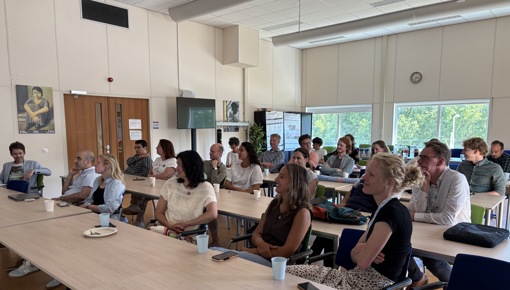Cancer is a major public health issue and poses a significant economic burden on society. The number of people with cancer is expected to increase significantly in the coming decades. The disease burden is also rising: cancer is not only becoming more common, but treatment options are expanding, meaning that more people will require long-term and intensive care.
It is therefore important to explore how cancer treatment can be made more appropriate and sustainable. This can be achieved, among other ways, by detecting cancer at an early stage, enabling simpler and more effective treatments. Additionally, cancer treatment can be further improved by providing faster feedback on its effectiveness and, where possible, making it less burdensome for the patient.
In 2019, a strong scientific collaboration was established through the Medical Delta Cancer Diagnostics 3.0 scientific program. The Medical Delta program ‘Cancer diagnostics for sustainable health care (CARES)’ builds on this foundation with concrete applications.
The program consists of three components:
- Development of user-friendly screening equipment for skin cancer that can also be used outside the hospital.
- Improvement of diagnostic tools that an oncological surgeon can use during surgery to make real-time decisions about the procedure.
- Further implementation of ‘theranostics’. Theranostics is a combination of nuclear diagnostics and therapy, in which physicians use a radioactive substance that both visualizes and treats the tumor simultaneously. This approach helps to tailor cancer treatments more precisely to the needs of each patient.
The developments within this program contribute to a more sustainable and affordable healthcare system through earlier diagnoses, (quantitative) indications, and more efficient treatments for only those patients who will truly benefit from them.
Goals
The Medical Delta Programme CARES has different goals for each component:
For the development of skin cancer screening equipment, the Medical Delta Program CARES aims to:
- design a prototype and conduct laboratory tests;
- conduct a pilot study in which collaboration with all relevant stakeholders is established (researchers, physicians, and skin therapists);
- expand the existing scientific ecosystem to include practice-oriented research and education in applied medical technology. This involves engaging both technology and healthcare students in various projects.
And with that:
- reduce healthcare burdens by enabling better referrals to dermatologists using a relatively low-cost instrument;
- enable better diagnosis of skin cancer and improve prognosis through early detection.
To improve diagnostic tools during surgeries, the Medical Delta Program CARES aims to:
- further develop imaging technologies that provide real-time visualization of the stage and progression of cancer during surgeries;
- implement these technologies in a clinical setting.
And with that:
- make it easier for surgeons to make well-informed decisions during surgery;
- increase the effectiveness of cancer surgeries and improve patient outcomes.
For theranostics, the Medical Delta Program CARES aims to:
- improve theranostic technologies and develop new imaging and treatment protocols for them;
- create a transdisciplinary research and educational ecosystem and infrastructure for knowledge and data exchange in the field of theranostics for cancer;
- introduce a new treatment approach (targeted radionuclide therapy) for a wide range of cancer types that are currently not included in the list of indications.
And with that:
- improve and personalize the diagnosis and treatment of patients through the implementation of new diagnostic and predictive imaging biomarkers;
- reduce unnecessary disease burden and healthcare costs by optimizing patient selection.
Contact
For more information or if you're interested in participating, please contact one of our innovation managers.








